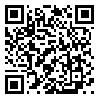Volume 25, Issue 2 (Summer 2024)
jrehab 2024, 25(2): 180-207 |
Back to browse issues page
Download citation:
BibTeX | RIS | EndNote | Medlars | ProCite | Reference Manager | RefWorks
Send citation to:



BibTeX | RIS | EndNote | Medlars | ProCite | Reference Manager | RefWorks
Send citation to:
Alizadeh T, Bahmani B, khanjani M S, Azkhosh M, Shakiba S, Vahedi M. Psychosocial Experiences and Support Resources of People With Albinism: A Thematic Synthesis. jrehab 2024; 25 (2) :180-207
URL: http://rehabilitationj.uswr.ac.ir/article-1-3277-en.html
URL: http://rehabilitationj.uswr.ac.ir/article-1-3277-en.html
Taher Alizadeh1 

 , Bahman Bahmani *2
, Bahman Bahmani *2 

 , Mohammad Saeed Khanjani1
, Mohammad Saeed Khanjani1 

 , Manouchehr Azkhosh1
, Manouchehr Azkhosh1 

 , Shima Shakiba3
, Shima Shakiba3 

 , Mohsen Vahedi4
, Mohsen Vahedi4 




 , Bahman Bahmani *2
, Bahman Bahmani *2 

 , Mohammad Saeed Khanjani1
, Mohammad Saeed Khanjani1 

 , Manouchehr Azkhosh1
, Manouchehr Azkhosh1 

 , Shima Shakiba3
, Shima Shakiba3 

 , Mohsen Vahedi4
, Mohsen Vahedi4 


1- Department of Counselling, School of Behavioral Sciences and Mental Health, University of Social Welfare and Rehabilitation Sciences, Tehran, Iran.
2- Department of Counselling, School of Behavioral Sciences and Mental Health, University of Social Welfare and Rehabilitation Sciences, Tehran, Iran. ,bbahmani43@yahoo.com
3- Department of Clinical Psychology, School of Behavioral Sciences and Mental Health, University of Social Welfare and Rehabilitation Sciences, Tehran, Iran.
4- Department of Biostatistics and Epidemiology, School of Social Health, University of Social Welfare and Rehabilitation Sciences, Tehran, Iran.
2- Department of Counselling, School of Behavioral Sciences and Mental Health, University of Social Welfare and Rehabilitation Sciences, Tehran, Iran. ,
3- Department of Clinical Psychology, School of Behavioral Sciences and Mental Health, University of Social Welfare and Rehabilitation Sciences, Tehran, Iran.
4- Department of Biostatistics and Epidemiology, School of Social Health, University of Social Welfare and Rehabilitation Sciences, Tehran, Iran.
Abstract: (5947 Views)
Objective Albinism is a genetic disease that causes vision limitations and skin and hair problems as a result of a disorder in melanin conversion. This disease can have wide psychosocial consequences among the sufferers. This study reviews and investigates the psychosocial experiences of people with albinism.
Materials & Methods This study is a review type and a thematic synthesis. This review examined the qualitative articles published until February 2023 in Persian and English in the field of psychosocial experiences of people with albinism. Articles related to extensive search were selected in PubMed, Scopus, Web of Science, SID, and Magiran databases, as well as the Google Scholar search engine.
Results In the first stage of the search, 868 articles were obtained, after removing duplicate and unrelated items and checking the titles and abstracts of the articles, 365 articles were omitted and 102 articles remained. By combining the codes of qualitative articles related to the psychosocial experiences of albinism, two main themes were obtained with the titles of psychosocial challenges of people with albinism (PWA) and support resources and coping strategies in people with albinism.
Conclusion PWA experience many challenges in life and they are equipped with some support resources and coping strategies to deal with these challenges, which reduces the difficulty of the mentioned challenges. Knowing these psychosocial challenges and support resources can help professionals and individuals who deal with PWA to make policies and plan and develop treatment and rehabilitation programs to create favorable and effective conditions.
Materials & Methods This study is a review type and a thematic synthesis. This review examined the qualitative articles published until February 2023 in Persian and English in the field of psychosocial experiences of people with albinism. Articles related to extensive search were selected in PubMed, Scopus, Web of Science, SID, and Magiran databases, as well as the Google Scholar search engine.
Results In the first stage of the search, 868 articles were obtained, after removing duplicate and unrelated items and checking the titles and abstracts of the articles, 365 articles were omitted and 102 articles remained. By combining the codes of qualitative articles related to the psychosocial experiences of albinism, two main themes were obtained with the titles of psychosocial challenges of people with albinism (PWA) and support resources and coping strategies in people with albinism.
Conclusion PWA experience many challenges in life and they are equipped with some support resources and coping strategies to deal with these challenges, which reduces the difficulty of the mentioned challenges. Knowing these psychosocial challenges and support resources can help professionals and individuals who deal with PWA to make policies and plan and develop treatment and rehabilitation programs to create favorable and effective conditions.
Type of Study: Systematic Review |
Subject:
General Psychology
Received: 18/03/2023 | Accepted: 2/10/2023 | Published: 1/07/2024
Received: 18/03/2023 | Accepted: 2/10/2023 | Published: 1/07/2024
Send email to the article author
| Rights and permissions | |
 |
This work is licensed under a Creative Commons Attribution-NonCommercial 4.0 International License. |





